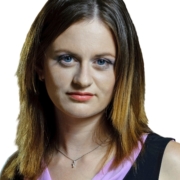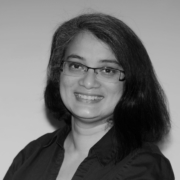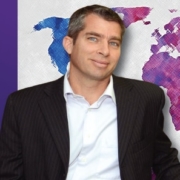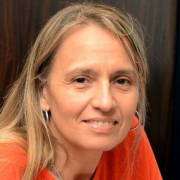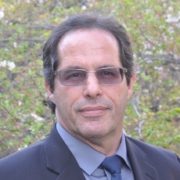Bassel Akar
Citizenship Education in Lebanon
What does citizenship education look like in a country affected by armed conflict and economic crises?
My guest today, Bassel Akar, has closely examined citizenship and history education in Lebanon. Some of his research focuses on the ways in which teachers demonstrate their agency for curricular and pedagogical change through innovative approaches inside the classroom.
Bassel Akar is Associate Professor of Education and Director of the Center for Applied Research in Education at Notre Dame University in Lebanon. Last year he published a book entitled Citizenship Education in conflict-affected areas: Lebanon and beyond.
Citation: Akar, Bassel, interview with Will Brehm, FreshEd, 207, podcast audio, July 20, 2020. https://freshedpodcast.com/basselakar/
Will Brehm 1:44
Bassel Akar, welcome to FreshEd.
Bassel Akar 1:47
Thank you.
Will Brehm 1:48
Can you give me a sense of the conflicts in Lebanon today?
Bassel Akar 1:53
The conflicts in Lebanon can be described in many ways. First, we have a history of armed conflict that the world is very familiar with, especially the Civil War from 1975 to 1990. And then we have had a series of internal conflicts, specifically between the Palestinian refugee camp militias and the Lebanese army. And then the Israeli invasion in 2006, and etc. At another level, which are happening today, let’s say the hottest forms of conflict include the ongoing internal dispute regarding the militarization of political parties like Hezbollah, for example. There is a second political party, which is called the Syrian Social Nationalist Party, and alongside Hezbollah, they are fighting along with the Syrian government army in Syria. So, they don’t get a lot of media coverage, as armies fighting in Syria. But the disarmament of political parties has been a condition after the Civil War in Lebanon. And so, while most of the political parties have formally or officially given up their arms, Hezbollah is a political party that is very committed and dedicated to its cause of liberating the south and making sure that its army stays strong.
Will Brehm 3:26
And what about economically?
Bassel Akar 3:27
So most recently, we have had an economic collapse that’s resulted from another form of destructive conflict, which is corruption. According to Transparency International, Lebanon ranks 137 out of 180, which is another way of reading it is they score 28 out of 100, meaning that we are in the bottom pool of 42 countries in the world. And the corruption is manifested in so many ways. In the economic sector, we have a central bank that has regulations that it has not, let’s say followed, or let’s say it has followed in an ad hoc manner. We have many commercial banks along with politicians who have exported their US dollars out of the country, which means that the purchasing power has significantly decreased to purchase imports into Lebanon. We are more of an importing country than exporting country. And so, the value of the Lebanese pound has crashed from 1,500 Lebanese pounds to the dollar, which today we are selling at 9,000 Lebanese pounds to the dollar.
Will Brehm 4:40
Wow.
Bassel Akar 4:41
Last week it reached 10,000. So, it’s now fluctuating between 8,500 to 9,000. Which means that if you earned a salary of 4.5 million, which used to be $3,000. Today, it’s worth about $600.
Will Brehm 4:58
Wow, wow. So major inflation?
Bassel Akar 5:01
Hyper.
Will Brehm 5:01
Hyperinflation.
Bassel Akar 5:03
Yes. It is a disaster. And so, we are now facing another wave of emigration from the country. We have a massive generation of young people who have now applied for immigration to Canada and other countries that have opened their borders and understand the situation here in Lebanon. In the past, the worry was this brain drain of Lebanon, but the reality is coming closer to that. Again, we are having a second wave, or another wave of a brain drain because many have lost hope of building a future here. Now those who are staying are mostly families, or people, who either have access to US dollars, are able to either make the best out of the situation. So, for example, if you actually have an income where you’re paid in US dollars, everything has become 60% cheaper!
Will Brehm 5:56
Yes, right.
Bassel Akar 5:58
So, this is the place to live. But this is the minority of the population. So, the BBC came out with a report a month ago that showed 60% of the people in Tripoli -and Tripoli is the second-largest city in Lebanon- living under $1 a day now, which shows that this is very serious. Now, another layer of conflict that’s related to this is -and that’s come out a few times in a number of podcasts and interviews on social media- is that at the central bank, and on the negotiation tables with the IMF (the International Monetary Fund) -because the Lebanese government is looking for support. Well, we have already had, I believe, three who have resigned from the negotiation tables claiming that the negotiations are almost at a gridlock. They are arguing whether there is a problem or not more than what are the solutions to the problem. So, there are many at the central bank, or in authority positions, who really don’t believe that there is such a crisis happening.
Will Brehm 7:07
So, have there been protests? I mean, it seems like this is a ripe environment for people to organize and say, “we want something different.” If there’s political crises at foot and economic crises?
Bassel Akar 7:20
Businesses have closed all over the country. Downtown Lebanon, which at one point was the indicator of a new post-civil war flourishing country, is a scene of an apocalyptic movie with graffiti on the walls and broken windows -with only a few stores still open, selling you know high-end brands. The protests on October 17, 2019 was the start of the revolution in Lebanon to bring down the political parties that are ruling the government. Well, after November, or December, the street protests had stopped for a while. Only a month and a half ago did we now see hunger protests on many of the streets. Basically, people claiming, and screaming, and shouting that they don’t have any money to eat.
Will Brehm 8:18
Wow. So, in this context where there’s different types of protests, there seems to be massive inequality, there seems to be elite sort of contempt for what daily life might look like for many people, for the sort of geopolitical problems and situations that Lebanon finds itself in. What does it mean to be a citizen in the country? This is your sort of area of expertise is citizenship education. So, you know, how would you describe what it means to be a citizen of Lebanon today?
Bassel Akar 8:53
So, in moments of instability, many times, you will see an increase in youth engagement on the streets. Nation-states where their governments are far more democratic and stable, many times in research, you will see reports of an apathetic youth. So, how do we get these young people engaged into voting, and etc., as we saw in the UK in the late 1990s, which is what led to the citizenship education program in the British National Education System. Here in Lebanon, we do have a very active and very engaged youth -extremely. Because their hope is that civil society steps up its game as a political party almost. So, we have seen many political parties formed through civil society. Many of the youth have taken leadership in that. In 2015, we had a waste management crisis, meaning that all the landfills were not just filled but also above capacity. The government authorities could not negotiate on the international agencies that were coming in to help with the waste management projects because they wanted a cut. And so, the “You Stink!” movement erupted, and this was led by the youth as well. Obviously, with support from others but-
Will Brehm 10:21
So, the youth are very engaged in many respects and sort of form a major part of civil society in Lebanon.
Bassel Akar 10:30
Yeah.
Will Brehm 10:31
Which, in a way, is a positive sign of citizenship, right? Being actively involved in the society in which you live. What about the government? How does the government understand citizenship?
Bassel Akar 10:42
It is important to remember that the government does have some sense of authoritarian political culture within it. Even though in our Constitution, we are a democracy. So, their understanding of citizenship in rhetoric is a representation of dialogue, conflict resolution, an appreciation for diversity regardless of race, gender, age, etc. It is also embraced, or I better say, negotiated a dual identity between Arab and Lebanese. This Arab and Lebanese, these nationalisms were some of the roots to the conflict in Lebanon -the armed conflict in the past. So, when the Civil War ended in 1990, we had a new national curriculum that was published in 1997, which is still ongoing today. Has not been revised since. In that national curriculum, there is a recognition for a Lebanese and Arab identity. Whereas in the past, when Lebanon was first formed as a republic in 1946, then the first national curriculum for that came out, and the emphasis was on the Lebanese identity. In the 1960s, when Arab nationalism grew in the region, this empowered many of the political parties in Lebanon to prompt a second reform in education. And so, the second national curriculum in Lebanon emphasized an Arab identity and replaced much of the Lebaneseisms in the national curriculum with a strong Arabism. So, this was the significance of the 1997 curriculum. So, that is how the government sees citizenship. It also sees citizenship as, in terms of practice, how we engage with the government institutions. Meaning, how do we form NGOs? How do we follow procedures of, let’s say, voting complaints, etc.? So, how do we use our government institutions?
Will Brehm 12:52
So, how do you form an NGO, for instance, in Lebanon?
Bassel Akar 12:57
Well, I will tell you that only those who take civics, which is the official program in the national curriculum, will know how to form an NGO. And I will tell you why the statement is loaded because, in Lebanon, the national curriculum for citizenship education is in three subjects: civics, history, and geography. And these three subjects are only in Arabic. Whereas you have other subjects that are offered in French and English. So, we are a trilingual curriculum. And so, the reason why they wanted to make sure that these three were in Arabic was because Arabic was seen as a language of citizenship, a language of belonging. Arabic being language of identity to being Lebanese and Arab. And so, we have 70% of the students in Lebanon are registered in private schools. So, 30% are in public schools. We have a number of education programs offered in Lebanon. So, there is the Lebanese program, along with the French baccalaureate, the high school diploma, GCSE, the British program, etc. So, students who are not in the Lebanese program -and the Ministry of Education does not have numbers. But with my own desk work, I am estimating around 10-15% of the students in Lebanon; they will never take civics, which is compulsory from first grade to 12th grade. So, they will never know how to form an NGO.
Will Brehm 14:31
So, wait. They will never take it because they are in private schools that are teaching the French baccalaureate or the British curriculum?
Bassel Akar 14:39
Exactly. And these are the students that are probably amongst the most privileged, who may take on leadership roles in the future.
Will Brehm 14:46
Right. So, maybe hence why some of the current leadership not seeing a problem today of hyperinflation.
Bassel Akar 14:53
Exactly. Yeah.
Will Brehm 14:55
Wow. So, that is quite incredible. This sort of stratification and segregation of students by class, by language, by ethnicity, by privilege in many ways. It sort of creates a very complex notion of what it might mean or that there would be multiple meanings of citizenship in Lebanon.
Bassel Akar 15:17
Exactly. But still, at the same time, the notion of citizenship, which is also in rhetoric, and in practice through teachers, is this idea that all our problems would be addressed if we were just a little more Lebanese. For example, in the classroom, there is a very strong nationalist rhetoric of we are Lebanese, and if we were only more Lebanese, then these destructive expressions of conflict would be eradicated. And the problem with that is, is that it stigmatizes having multiple identities, which is the essence of cosmopolitan or global citizenship. It doesn’t celebrate these different identities. So, one is almost not embarrassed but will think twice before expressing their religious identity or political identity inside the classroom.
Will Brehm 16:18
Right. What other teaching and pedagogical practices sort of emerge out of some of the government rhetoric on citizenship education, and policies of civics and whatever it is in the curriculum?
Bassel Akar 16:31
I would say the most dominant pedagogical practice is getting students to memorize text so that they could accurately recite it for some form of formal assessment purpose. And the reason why they do this is at many levels. One is for accountability. For teachers, it is the safest way of showing that their students have learned. It’s also become a dominant part of the pedagogical culture. And this is not just in Lebanon, but this is very common in many societies affected by armed conflict, but mostly also in the global South. Northern Ireland is a context that is affected by armed conflict, but their pedagogical culture is far more constructive and collaborative and dialogic. There is also this idea that dialogues in the classroom may generate conflict; they may open doors for sensitive and controversial issues that teachers will confess and say, we are not ready to manage these emotions and these sensitive conversations inside the classroom. And having said that, it is also important to remember that or to know that only 23.5% of the teachers in Lebanon have some form of written qualification to teach that’s recognized by the Ministry of Education. This is less than a quarter, and even fewer teachers than that actually have a teaching diploma as a written qualification.
Will Brehm 18:01
So, who is teaching? Who are these teachers then?
Bassel Akar 18:05
They are individuals who have, let’s say, been recognized as professionals in the field, maybe depending on the degree that they’ve had. So, the teachers in the more rural areas will have lower-level qualifications, for example, let’s say a high school diploma than those in more urban areas like the city. In civics, it is extremely common to find civics teachers who have had a law degree. So, when you go to a school, and you say, yes, I have a law degree, or I studied law, they will almost automatically contract you as a civics teacher.
Will Brehm 18:44
And is that problematic in any way? I mean, it might sound good to have a lawyer as a civics teacher.
Bassel Akar 18:50
Of course, it is problematic. So, I think a healthy law classroom would open up debate on how to interpret laws and constitutions. But when you have an individual who is professionally trained in law, and then you position this person in a formal education system, where by default, the teacher is a provider of knowledge or a transmitter of knowledge, there are not going to be any debates inside that classroom, unless if it comes from the teacher. So, I think some of the themes that we continue to see in education research in Lebanon are two. One is the extent to which teachers are disempowered as authorities of learning and teaching inside the classroom, as researchers of teaching and learning inside the classroom. And then how memorization disempowers children and I will explain. I once got into a debate with a senior school administrator, who said, well, what is wrong with memorization? And this was one of the leading private schools, not just in the country, but in the world. They have school branches all over the world.
Will Brehm 20:08
And what did you say?
Bassel Akar 20:09
I froze, I didn’t know where to begin. It turned out there was a lot of tension in the conversation. But one of the biggest issues with memorization is that obviously, number one, it disregards the knowledge that the child brings to the classroom. So, for example, if you are asking children to interpret a story or explain how they solved a formula. If the knowledge that you as a teacher have is the ultimate knowledge, whatever they are going to bring in, they will receive your feedback as giving their knowledge very little value or no value at all. So, this action by itself is very disempowering because it says, I am not an authority here to the child. And if I am not an authority in my learning, or in the classroom, then I have no say in things.
Will Brehm 21:03
So, the lack of dialogue, the disempowering of children in the way in which classrooms are run, or a typical classroom is run, let’s say, how does this affect citizenship and the idea of citizenship in Lebanon?
Bassel Akar 21:18
Well, it creates a tension between a submissive form of citizenship that is actually being nurtured inside the classroom, on the one hand, with an idea of a more active form of citizenship that school policy, and teachers, and principals call for, on the other hand.
Will Brehm 21:41
Right. So, the policy rhetoric looks different from the practice.
Bassel Akar 21:46
In addition to that, when young people or students are in a classroom that does not allow the children to bring in topical issues to discuss and debate, and they are only listening to ideals that a government, let’s say book has published for them. Many of their reactions are, wait, this is quite hypocritical. This government, who we see as corrupt, is now telling us how to run a democratic society. So, what happens here? They then turn away from this government institution, I am going to call it the school -this formal institution. The pedagogy creates a negative image of this institution. So, where do children who have this desire, this urge, this need to participate and engage and give and advocate and everything, where do they turn to? They turn to civil society. We have an extremely rich and active, and engaged civil society. And civil society can include religious institutions, can include political institutions, and yes, this can be harmful, and this can be helpful. But for the most part, it has also been a very important private public sphere for the children.
Will Brehm 23:08
Hmm. It is interesting. I mean, it seems like the citizenship education is simply happening in non-state settings.
Bassel Akar 23:16
It can definitely. I mean…
Will Brehm 23:19
I mean, and I guess there is a formalized curriculum, of course, that is teaching civics, but the sort of quote-unquote, real version of citizenship education, often it sounds like is happening inside these civil society institutions.
Bassel Akar 23:33
Or at homes.
Will Brehm 23:34
Or at homes, right, by families themselves.
Bassel Akar 23:36
Yeah, exactly.
Will Brehm 23:38
So, I mean, obviously, there is a disconnect here. Should they be connected? Should the civics curriculum be providing some sort of citizenship education that is currently being provided by families and civil society groups. Or is it okay to keep them disconnected? In your opinion, of course.
Bassel Akar 23:57
I think that the relationship between them or among them -there is always going to be a relationship. As soon as one of these parties, let’s say between school and civil society and family, as soon as one of them creates some sort of authoritarian culture, there is going to almost by nature, there’s going to be a shift in trust, identity, sense of belonging to the others, right. So, I think the relationship already is there. Yes, I think there should be a more active calibration among the three, but that calibration does not necessarily always have to be making sure that the beliefs are all the same, etc. I think that there are some minimum practices, basic understandings such as learning how to listen actively, express oneself, appreciate, capitalize, and celebrate diversity.
Will Brehm 24:56
Yeah. And so, what do you think some of your insights into citizenship education in Lebanon specifically? Is there anything that we can learn about global citizenship education sort of more generally?
Bassel Akar 25:11
I think one aspect in the Lebanese culture that I have always appreciated within the framework of global or what I usually refer to as cosmopolitan citizenship is the value for learning several languages. So, we have a massive diaspora. And actually, a large part of our GDP comes from our diaspora that sends money to Lebanon. So, we have a large part of our population that has hyphenated legal status, you know, Lebanese-Canadian, Lebanese-Brazilian, etc. And this is a very important, I think, part of being a cosmopolitan or global citizen because, through your family, you are connected to the rest of the world on a daily basis. It is within your family tree. Now, the danger in this, let’s say Lebanese-centric view of global or cosmopolitan citizenship is that when you have other cultures coming into Lebanon, they are seen as almost as threats rather than opportunities. For example, the Syrian refugee crisis that erupted in, you know, 2011 from the Syrian war, we have seen an increase in obviously racism and violence towards Syrian refugee communities because of their identities, not just as Syrians but also as refugees. The Syrian refugees have brought back many memories, especially for the Christian groups of the Civil War, who saw the Palestinians fighting their war with Israel as a source of conflict in Lebanon. So, many of the prejudices tore against the Syrian refugee communities or the Iraqi refugee communities have come from this history.
Will Brehm 27:03
So, it is a really complicated history that obviously is getting even more complicated with new crises that emerge almost, you know, every year, or every decade. So, you know, in this context of multiple crises over decades that are dynamic but still hold legacies into the present. Is there hope in your mind?
Bassel Akar 27:27
There is, and my hope lies in teachers. Though over the past three years, my research has taken a shift towards innovative teachers who have given themselves the authority to translate the curriculum themselves. You see, the curriculum in Lebanon is very open. The aims are broad, the themes are broad, but we’ve had authorities translate the curriculum into textbooks that have landed on students’ desks to recite. I have worked with a handful of civics teachers who have transformed their classrooms -and this is both in public and private schools- into hopeful places. What they have done is they have reimagined the concepts and the themes that are presented in the book. They have brought in, obviously topical issues, but they have positioned the children as investigators, and researchers, debaters inside the classroom. I think one common element is that they have all been inspired by somebody. And I think it is very important that teachers continue to inspire each other. They continue to experiment. They continue to have that autonomy to pioneer new ways or risky ways of learning inside the classroom and then find ways to share those. I think that is what gives me hope.
Will Brehm 28:50
Well, Bassel Akar, thank you so much for joining FreshEd. Really a pleasure of talking today.
Bassel Akar 28:55
Thank you, Will. I really appreciate it.
Want to help translate this show? Please contact info@freshedpodcast.com
Related Author Projects/Publications
Influences of nationalism on citizenship education: Revealing a ‘dark side’ in Lebanon
Reframing approaches to narrating young people’s conceptualizations of citizenship
The space between civic education and active citizenship in Lebanon
Mentioned Resources
The Lebanese civil war (1975-1990): Causes and costs of conflict
Discursive constructions of Palestinian Refugees in Lebanon
The neglected: Palestinian refugees in Lebanon and the Syrian refugee crisis
Evolution of nationalism in Lebanon: How revolution is shaping a unified unity
Lebanon: A country of emigration and immigration
Lebanese nationalism versus Arabism
Lebanon’s versatile nationalism
Related Resources
Lebanese Center for Civic Education (LCCE)
Politics of a garbage crisis: Social networks, narratives, and frames of Lebanon’s 2015 protests
Garbage infrastructure, sanitation, and new meanings of citizenship in Lebanon.
Parochial education in a global world? Teaching history and civics in Lebanon
Human rights and peace education in the Lebanese citizenship textbooks: A comparative lense
Citizenship in multicultural Lebanon: A critical approach
International donors, NGOs, and the geopolitics of youth citizenships in contemporary Lebanon
NGOs and the making of youth citizenship in Lebanon
The culture of motherhood: An avenue for women’s civil participation in South Lebanon
Nature, environmentalism, and the politics of citizenship in post-civil war Lebanon
Fifi the punishing cat and other civic lessons from a Lebanese public kindergarten school
Multimedia Resources
Hezbollah: The most powerful militant group?
Have any useful resources related to this show? Please send them to info@freshedpodcast.com


